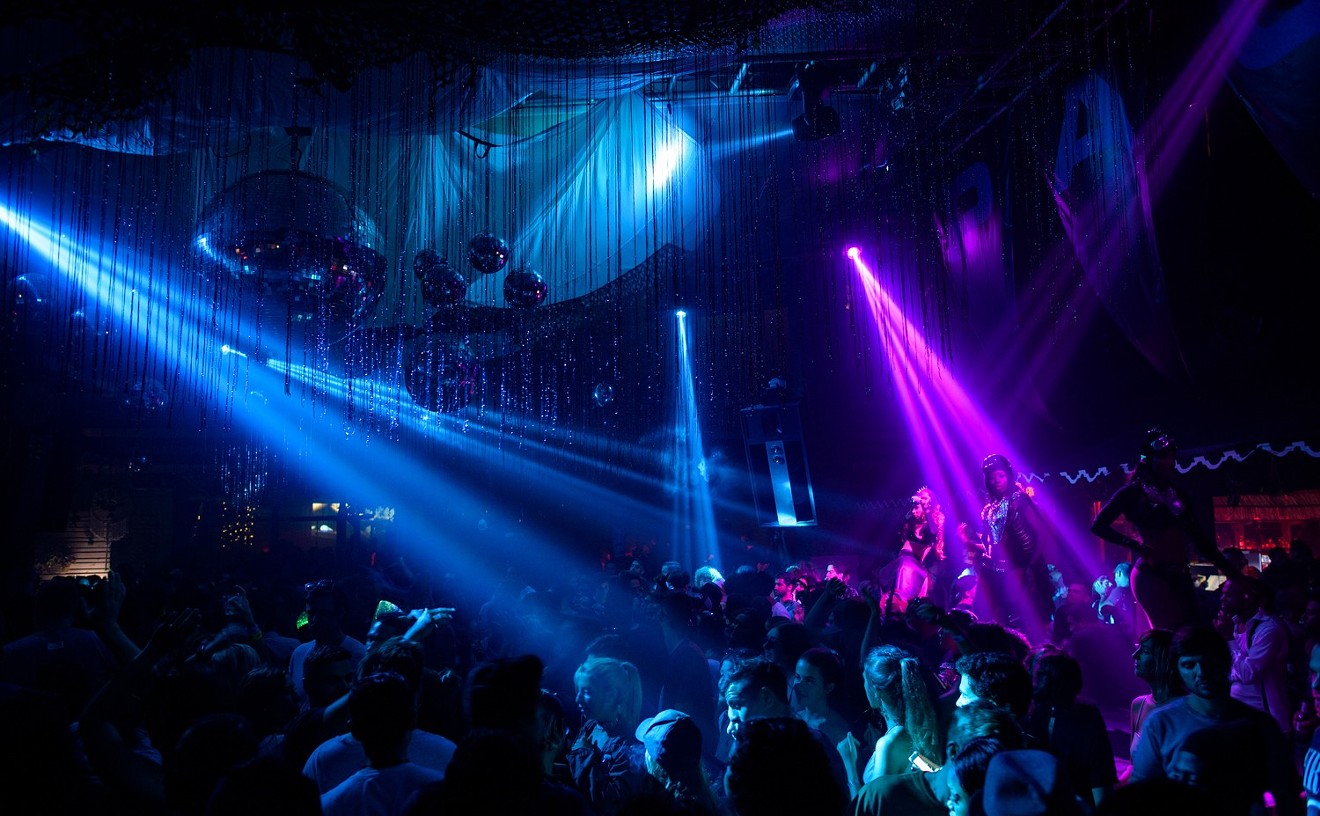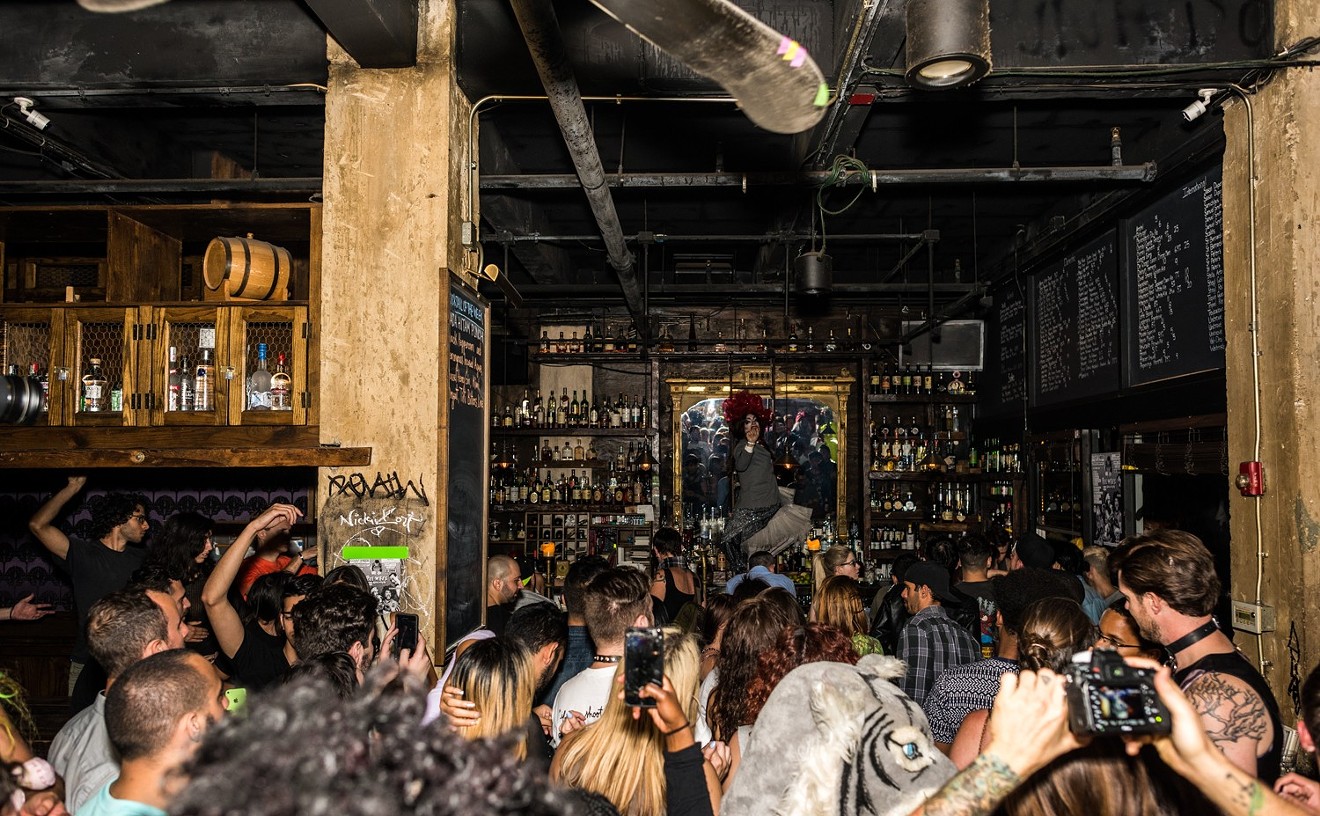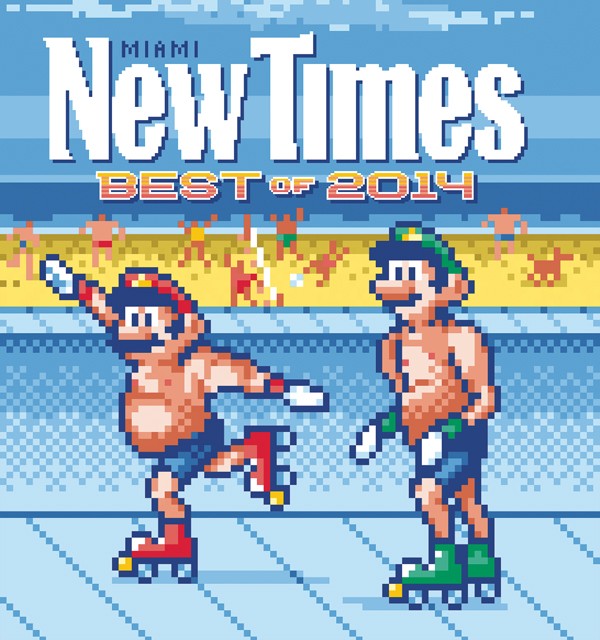This Winter Music Conference pop-up-club-turned-permanent-party-spot is downtown Miami's home for, in the words of owner, promoter, and Massive Ideas founder Anders Scherberger, "weirder stuff that doesn't really fit into the normal category." And these days, the whole DWNTWN MIA crowd desperately needs a legit, late-night hangout that isn't just trying to re-create some hipster version of South Beach in a lightly renovated, heavily graffitied warehouse. For a time in the mid- to late 2000s, the NE 14th Street strip was the undisputed epicenter of mainland Miami's underground music and nightlife scene. There was I/O Lounge and PS14 and Pawn Shop and then the Vagabond, but they're all gone now. Yet in a certain way, the Nest is the offspring of that era, despite opening only this year. Now it would definitely be premature to predict any impending, all-out reincarnation of the spirit of 2006. But at least the cool kids and their favorite local acts still have someplace to party for free while dropping that Miami bass, hip-hop, and indie rock and laughing, "Screw the VIP."
Best Venue for Local Acts
The Nest
- 62 NE 14th St., Miami, 33132 Map
- 786-766-2411
- www.thenestmia.com/
Best Strip Club
Wonderland

Lap dances make a man hungry. Fortunately, there exist splendorous houses of sensual pleasure like Wonderland, a strip club and dining establishment serving full-friction entertainment alongside chimichurri skirt steak with truffle mashed potatoes. While the more exotic aspects of a typical evening at this self-described "ultimate gentleman's club" are overseen by topless professionals with names like Tatyana, Charity, and Kristal, the never-closed kitchen is run by a former Novecento chef who has concocted an ambitious nudie-bar menu of steak-house-lite snacks and fancy American bistro fare. For the ideal five-course boobies-and-food experience, we suggest a $100, multisong sortie to the intimately lit, velvet-curtained private rooms, followed by the $12 shrimp tempura with soy sake sauce, a $10 post-appetizer martini, and the $17 tilapia fillet with chili-garlic spinach, all finished off with the flan de caramelo. Now that's what we call a happy ending. Wait, no. Not that kind.
- 7770 Biscayne Blvd., Miami, 33138 Map
- 305-631-2564
- goldrushcabaret.com
Best Dance Club
Club Space

Last year, Club Space founder Louis Puig sold his stake in the crown jewel of Miami's nightlife scene after 13 years of pushing the dance music mecca into the hearts and minds of booty-shaking people worldwide. How popular is Space? Popular enough that it has to open only once a week, on Saturday nights, to remain profitable. How many other nightclubs can get away with that? Now that new ownership has taken over Space, the best thing they've done so far is leave well enough alone. Except for some minor upgrades here and there, you'll encounter the same ol' familiar venue. This is still the place to go for people who don't want the party to ever end, dancing on the downtown terrace well past sunrise. It has learned to coexist with its new condominium neighbors to the east. But will it survive the encroachment from the planned Miami Worldcenter, the mega-shopping complex due to rise practically next door? Put your money on Space pulling through. In the event of a nuclear fallout, there are two things guaranteed to survive: cockroaches and Club Space.
- 34 NE 11th St., Miami, 33132 Map
- 786-616-6742
- clubspace.com
Best Nightlife Impresario
Emi Guerra

What were you doing at 22? Between graduating from college and looking for a job, you were probably getting high in your parents' spare bedroom while watching Grandma's Boy on cable. Emi Guerra, on the other hand, was cofounding one of Miami's most influential nightclubs, Space. But beyond that, the reason Guerra's name is synonymous with the best that dance music has to offer is because the man dreams big. Whether it's bringing Swedish House Mafia's Masquerade Motel to Miami for the first time or persuading Deadmau5 to give South Florida another shot by performing a free show at the Ice Palace, Guerra has the right booking agents and managers on speed dial. Sure, there have been hiccups in Guerra's career — UR1, an arts and music festival scheduled to take place during Art Basel, didn't pan out. But it says something about Guerra that he was able to dust himself off afterward and continue his envious nightlife career as if nothing happened. Innovators know there's no success without risk, and luckily for Dade County's dance fiends, Guerra's risks have single-handedly helped turn the Magic City into an EDM mecca.
- 34 NE 11th St., Miami, 33132 Map
- 786-616-6742
- clubspace.com
Best Jazz Night
Downtown Jazz at the Corner

Gone is the beloved Van Dyke Café, another victim of South Beach's rocketing property values, but thankfully the Magic City jazz that thrived upstairs at the Lincoln Road standby lives on downtown. Every Tuesday night, the Corner serves a delicious slice of syncopation. The atmosphere is much more subdued than the buzzed weekend crowds that make the Corner a go-to post-4 a.m. spot, but you aren't here to party, after all. Instead, sip a perfectly made craft cocktail and enjoy the music. Musicians change weekly, but there's never a bad set, which starts around 10:30 p.m. No matter who's playing, you'll never pay a cover.
- 1035 N. Miami Ave., Miami, 33136 Map
- 305-961-7887
- thecornermiami.com
Best Music Festival
III Points
A lot of music festivals have come and gone, but rarely is there one that really tries to surpass Miami's expectations. III Points did exactly that last October with a massive effort to rally Miami's neighborhood du jour, Wynwood, through music, art, and technology. Mana Wynwood Production Village served as the central hub, which featured performances by DJ Shadow, James Murphy, XXYYXX, and Jamie xx. The performances spilled over into nearby venues such as Bardot, Gramps, and Grand Central. A highlight was the Juan MacLean set at Gramps, which turned the perennial indie music venue into a house lover's paradise. But if you really dived headfirst into III Points, you would have discovered a seemingly endless schedule of events and panels that both entertained and educated attendees. The most surprising thing was that founders David Sinopoli and Erica Freshman were able to pull the whole event off with only two months of preparation. It'll be interesting to see what the two can do in 2014 now that they've had a full year to organize.
- 318 NW 23rd St., Miami, 33127 Map
- 305-573-0371
- manawynwood.com
Best Concert
The XX

Damn geography. Thanks to our spot on the map, Miami gets screwed over on a lot of great shows. Our peninsular location means many traveling bands simply can't afford to cruise all the way down to the Magic City. Unless they have the funds to buy plane tickets for the musicians and their whole crew, driving up and down just to play to half a room isn't worth it. You've got to know you'll pack the house. Such was the case with the dreamy, lovelorn beauties of England's the XX. Though they'd been indie darlings since the smashing success of 2009's self-titled debut, they just couldn't muster the money to make Miami happen until 2012's Coexist finally shot them further up the charts. How were they to know a sold-out crowd ready to sing along to every word was patiently waiting? "We'd like to make a formal apology for taking our damn time," singer Oliver announced near the end of the show. The energy had been nothing short of electrifying from start to finish. A more welcome debut had never been seen, and surely Miami is a stop the London kids will never miss again, no matter how far out of the way we are.
- 1700 Washington Ave., Miami Beach, 33139 Map
- 305-673-7300
- fillmoremb.com
Best Radio Station
Dade County Radio
Did you know that cell phones operate on radio signals and that Wi-Fi is based on the radio frequency spectrum? It's a fact. And what it means is that internet radio is real radio, and your mobile phone is just as much a radio as your old boombox. These are the principles by which the underground sounds of the Miami streets make their way to places like the Ukraine, one of the largest audiences for Dade County Radio, an independent local station that operates just like the big boys at Clear Channel by tracking, monitoring, and reporting the songs it plays. The difference is that unlike the corporate giants, Dade County Radio is committed to offering a professional outlet for local artists to be heard on a world stage. Formerly known as DaOne Radio, the station has repped local talent from Junior Reed to reggae label Black Shadow. The station's motivational approach to encouraging fresh, new sounds for the airwaves is what radio technology is really all about. It works directly with the CMJ college music charts and the U.S. Congress-sanctioned Radio Wave Monitor for reporting BDS spins, and it's partners with 89.1 FM the Streets. As for the tunes, Dade County Radio plays a whole lot of gangsta rap, which the station recognizes as a vital art form with real economic power. That's the power of the airwaves, even if they're landing on your laptop.
Best Latin Band
Palo!
The infectious sound of los timbales and bongos fuse with the keyboard as the sax and vocals crescendo. In a matter of seconds, a seductive melody reverberates throughout the room, prompting the party people to involuntarily and uncontrollably shake their asses. They have caught Palo! fever. For more than a decade, the Afro-Cuban funk band has been bringing el sonido caliente to the Magic City. Steve Roitstein, who also teaches at Miami Dade College, is the Palo! mastermind. Prior to becoming the leader of the band, el músico worked with Willy Chirino, Julio Iglesias, and other Latin music legends. He even snagged a Latin Grammy in 2001 for a song he produced for Celia Cruz. Success was definitely on his side, but Roitstein wanted to create something he could call his own. So Palo! was born. The descarga masters may share the same name as the Afro-Cuban religion, but the story behind their moniker comes from a Cuban man who couldn't pronounce Roitstein's first name. To help him out, Roitstein explained it was like "Esteban" but in English. That's when el cubano corrected him by saying, "Ah, Estick!" Because the word palo is Spanish for "stick," the band name was born. More than a decade later, the group continues to spread its rumba across the 305. Just last year, the bandmates released their second album, Palo! Live, which was recorded during their tenth-anniversary bash at the now-defunct PAX. The band was also featured in Miami Boheme, a documentary on PBS showcasing Miami's Latin fusion bands, and their music recently aired on public radio. Roitstein and his crew are now working on a third album set to be released this fall. But you won't have to wait till then to hear them cantar la salsa — chances are you'll catch 'em throwing it down on any given weekend.
Best DJ
DJ Icue
DJ Icue began his career in 1995 with a KRS-One record and a dream. Since then, he's played a Calle Ocho stage with Pitbull, Bayfront Park with Gang Starr, and downtown Miami with the Boot Camp Clik. He's even had the Marley brothers by his side and watched regular crowds waving their lighters to his massive tunes at Purdy Lounge, where he's held down the decks for the South Beach club's Monday-night Caribbean, reggae, and dancehall party for more than five years. Once upon a time, this Full Sail University graduate was in charge of dubbing South Park into Portuguese for all of Brazil and Cops into French for all of France, but he dropped those gigs to pursue his passion. Today he produces his own music, makes his own professional motion graphics, performs live video DJ sets regularly, and spins about six local parties a week. You can find him in regular rotation at the aforementioned Purdy, poolside at the Shore Club, at the Bar in Coral Gables, or at the Sandbar in the Grove. Combine all of that with his ability to scratch, mix, and blend vinyl, work with all the latest and greatest computerized DJ technology, and spin six-hour sets without a breather, and you have the hardest-working DJ in Miami. His commitment to the art is inspiring to anybody who wants to make a life in music.





